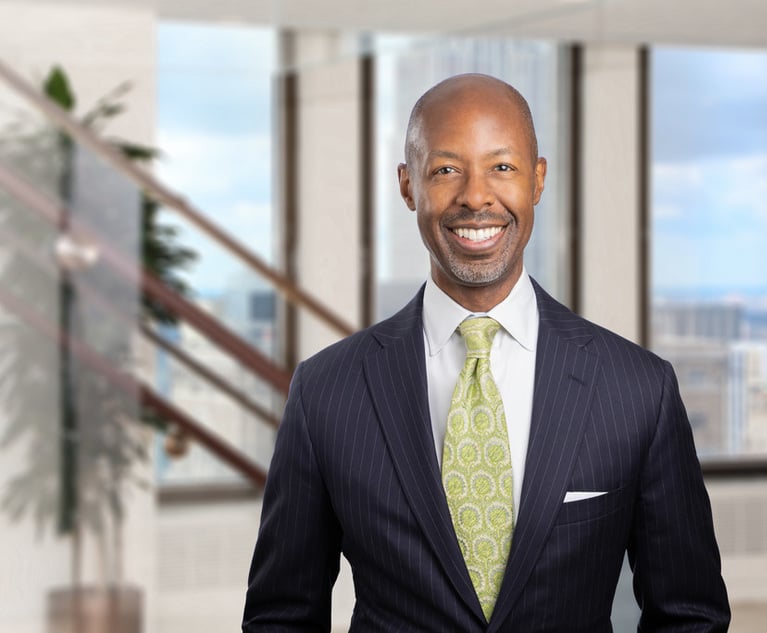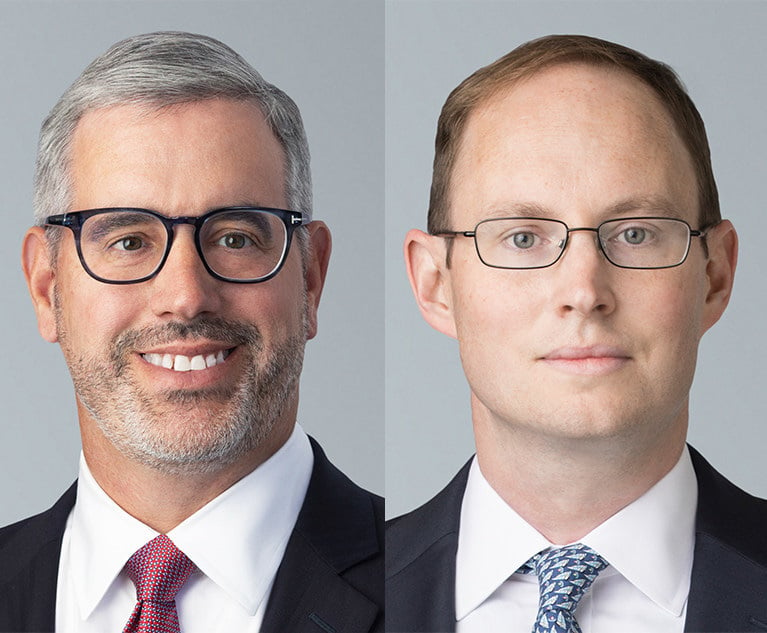Pace Law Dean David Yassky Steps Down Amid Faculty Discontent
In an exclusive interview with the Law Journal, David Yassky said he has been discussing the transition back to teaching with university president Marvin Krislov for the past several months. But he evaded questions on whether the move was voluntary.
April 05, 2018 at 03:49 PM
4 minute read

David Yassky, dean of Pace University's Elisabeth Haub School of Law, is relinquishing the position at the end of the semester after clashing repeatedly with the faculty.
Horace Anderson Jr., associate dean for academic affairs and a professor of law at the school, will take over as interim dean while the law school seeks to fill the vacancy.
In an exclusive interview with the New York Law Journal, Yassky said he has been discussing the transition back to teaching with university president Marvin Krislov for the past several months. But he evaded questions on whether the move was voluntary.
He did say that a new dean is good for the law school “because for the next phase it would be good to have someone who doesn't have all the baggage.”
“Dean Yassky came to Pace in 2014 to see the Law School through the post-recession period of transition and challenges in legal education, and he has done so admirably,” Krislov said. “Pace's Law School is stronger, it is serving our students better and it is positioned for further initiatives to enhance our program and build upon its strong relationship with the legal community.”
Two faculty members at Pace, both of whom spoke on condition of anonymity, said that Yassky was pushed out of the deanship after losing the confidence of campus constituencies.
The faculty did not take a formal vote of no confidence in Yassky, according to one professor, but Pace University leaders were made aware that he would not have the faculty's support should a vote occur.
“There was a lack of trust and a lack of confidence in Dean Yassky,” the professor said. “There was a lot of dishonesty and a lot of hiding the ball.”
Yassky began clashing with the faculty almost immediately after assuming the deanship, they said. He ruffled feathers by cutting faculty salaries and removing several staff members early in his tenure. Yassky acknowledged cutting faculty but said it was done by attrition.
The law school's community was not pleased with Yassky's short-lived bid last fall for a seat in the New York Senate, fearing it would divert attention from the law school.
“There's been debate and kind of disagreement every step of the way because if you have smart people who care deeply there are going to be different perspectives about what's the right way to go,” Yassky said.
But he added, “I'm pretty confident that my colleagues and I have logged more hours in faculty meetings over the last four years than is advisable.”
Yassky said the cost cutting was good for students because it allowed the school to increase scholarship dollars by 10 percentage points during his tenure.
As evidence of his success, Yassky pointed to rising bar passage rates, improving U.S. News and World Report rankings, better student employment prospects and more applications for admission. “I think students are certainly happy with where we are,” he said.

“David is being sort of humble in talking about his accomplishments,” said Anderson, the interim dean. He said that the school will be able to innovate, such as coming up with new ways of offering a J.D. because of the decisions Yassky made. “Those things are possible now because we are now on steady footing,” Anderson said.
Before coming to Pace, Yassky was chair of the New York City Taxi and Limousine Commission. Yassky also served for eight years in the New York City Council, representing Brooklyn Heights, Park Slope, Greenpoint and Williamsburg.
In the 1990s, Yassky served under then-Rep. Chuck Schumer as chief counsel to the House Subcommittee on Crime, helping to enact the Brady Law, the Assault Weapons Ban and the Violence Against Women Act.
In 1998, Yassky joined the faculty of Brooklyn Law School, specializing in administrative law and constitutional law. His scholarship on the Bill of Rights has been published in leading law reviews and has been cited widely in academic journals and judicial opinions. He has also taught at NYU Law School.
Yassky earned his A.B. at Princeton University, and his J.D. at Yale Law School, where he served as articles editor of the Yale Law Journal and was awarded the Potter Stewart Prize for best moot court argument.
This content has been archived. It is available through our partners, LexisNexis® and Bloomberg Law.
To view this content, please continue to their sites.
Not a Lexis Subscriber?
Subscribe Now
Not a Bloomberg Law Subscriber?
Subscribe Now
NOT FOR REPRINT
© 2025 ALM Global, LLC, All Rights Reserved. Request academic re-use from www.copyright.com. All other uses, submit a request to [email protected]. For more information visit Asset & Logo Licensing.
You Might Like
View All
Attorneys 'On the Move': Structured Finance Attorney Joins Hunton Andrews Kurth; Foley Adds IP Partner
5 minute read
Attorneys 'On the Move': McGuireWoods Hires Digital Healthcare Lawyer; Duane Morris Adds Corporate Partner
4 minute read
Attorneys 'On the Move': Greenspoon Marder Boosts Litigation Practice; Former Federal Prosecutor Joins Baker Botts
4 minute read
Attorneys 'On the Move': Paul, Weiss Adds Two Asset Management Partners; Restructuring Lawyer Joins Latham & Watkins
4 minute readTrending Stories
- 1Restoring Trust in the Courts Starts in New York
- 2'Pull Back the Curtain': Ex-NFL Players Seek Discovery in Lawsuit Over League's Disability Plan
- 3Tensions Run High at Final Hearing Before Manhattan Congestion Pricing Takes Effect
- 4Improper Removal to Fed. Court Leads to $100K Bill for Blue Cross Blue Shield
- 5Michael Halpern, Beloved Key West Attorney, Dies at 72
Who Got The Work
Michael G. Bongiorno, Andrew Scott Dulberg and Elizabeth E. Driscoll from Wilmer Cutler Pickering Hale and Dorr have stepped in to represent Symbotic Inc., an A.I.-enabled technology platform that focuses on increasing supply chain efficiency, and other defendants in a pending shareholder derivative lawsuit. The case, filed Oct. 2 in Massachusetts District Court by the Brown Law Firm on behalf of Stephen Austen, accuses certain officers and directors of misleading investors in regard to Symbotic's potential for margin growth by failing to disclose that the company was not equipped to timely deploy its systems or manage expenses through project delays. The case, assigned to U.S. District Judge Nathaniel M. Gorton, is 1:24-cv-12522, Austen v. Cohen et al.
Who Got The Work
Edmund Polubinski and Marie Killmond of Davis Polk & Wardwell have entered appearances for data platform software development company MongoDB and other defendants in a pending shareholder derivative lawsuit. The action, filed Oct. 7 in New York Southern District Court by the Brown Law Firm, accuses the company's directors and/or officers of falsely expressing confidence in the company’s restructuring of its sales incentive plan and downplaying the severity of decreases in its upfront commitments. The case is 1:24-cv-07594, Roy v. Ittycheria et al.
Who Got The Work
Amy O. Bruchs and Kurt F. Ellison of Michael Best & Friedrich have entered appearances for Epic Systems Corp. in a pending employment discrimination lawsuit. The suit was filed Sept. 7 in Wisconsin Western District Court by Levine Eisberner LLC and Siri & Glimstad on behalf of a project manager who claims that he was wrongfully terminated after applying for a religious exemption to the defendant's COVID-19 vaccine mandate. The case, assigned to U.S. Magistrate Judge Anita Marie Boor, is 3:24-cv-00630, Secker, Nathan v. Epic Systems Corporation.
Who Got The Work
David X. Sullivan, Thomas J. Finn and Gregory A. Hall from McCarter & English have entered appearances for Sunrun Installation Services in a pending civil rights lawsuit. The complaint was filed Sept. 4 in Connecticut District Court by attorney Robert M. Berke on behalf of former employee George Edward Steins, who was arrested and charged with employing an unregistered home improvement salesperson. The complaint alleges that had Sunrun informed the Connecticut Department of Consumer Protection that the plaintiff's employment had ended in 2017 and that he no longer held Sunrun's home improvement contractor license, he would not have been hit with charges, which were dismissed in May 2024. The case, assigned to U.S. District Judge Jeffrey A. Meyer, is 3:24-cv-01423, Steins v. Sunrun, Inc. et al.
Who Got The Work
Greenberg Traurig shareholder Joshua L. Raskin has entered an appearance for boohoo.com UK Ltd. in a pending patent infringement lawsuit. The suit, filed Sept. 3 in Texas Eastern District Court by Rozier Hardt McDonough on behalf of Alto Dynamics, asserts five patents related to an online shopping platform. The case, assigned to U.S. District Judge Rodney Gilstrap, is 2:24-cv-00719, Alto Dynamics, LLC v. boohoo.com UK Limited.
Featured Firms
Law Offices of Gary Martin Hays & Associates, P.C.
(470) 294-1674
Law Offices of Mark E. Salomone
(857) 444-6468
Smith & Hassler
(713) 739-1250






